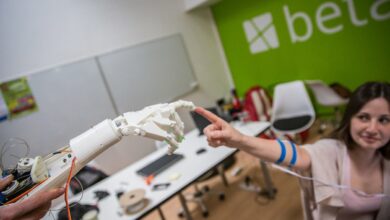
SUMMARY: EDUPUNK 2.0 – The Future Of Digital Education
28th October 2014, 7pm at DigitasLBI, 146 Brick Lane, London E1 6RU
Eva Pascoe sums up and responds to the debate from Cybersalon’s latest event, EDUPUNK 2.0.
Cybersalon EDUPUNK 2.0, 28th October, hosted by Digitas LBi, London.
With guest speakers: Anya Kamenetz, Martin Poulter, Helen Reddinton, Helen Armfield, chaired by Stefan Lutschinger.
Do you make decisions for a living? Then the robots are coming after you. Just a few days ago, in San Francisco, my teenage daughter made friends with Knight, a newly fangled robot who has decision making capabilities and can replace security guards or sales assistants. With time, it will replace teachers, human resource professionals and even business executives. It can see, hear, smell and recognise faces. It can upload terabytes of data to the cloud. Moore’s Law has been valid for about fifty years and finally the chickens are coming to roost – we, the humans, are looking somewhat underwhelming in comparison to what IBM’s Watson, Google’s Deep Mind and the new white plastic Knights can offer to the labour market.
At about £20,000 apiece, it is a bargain comparing to the costs of raising and educating a child. Not only can robots replace much more expensive and fallible humans but act in a more environmentally friendly manner too, as Knight would consume comparably less resources and energy than a human worker.

A cheap and sustainable workforce – isn’t the future going to be great? But hang on a minute, what about the humans? How are we going to make a living if the cheap and eco-friendly Knight presents a more enticing offer to any potential employer?
The Office of National Statistics reported only last year that half of recent UK graduates are stuck in non-graduate jobs, with the true graduate unemployment rate hovering at around 30%, and all of this even before the white Knights land in the UK and take the jobs that we still have.
Fifty years ago in the summer of 1964, Leon Bagrit, CEO of the then world’s biggest manufacturing company Elliot, recorded a lecture titled The Age of Automation. Leon was a wise man, through the enormous success of automation within his company he had a front seat at the theatre on humans being replaced by machines. Bagrit foresaw that the automation revolution was to sneak up on us unawares. He wanted to help to prepare his people for the cataclysm of a world with no work for humans, and his solution was education. ‘Automation is education, and education is automation’ – he repeated this mantra throughout the series of Reith Lectures. Following Bargrit, Cybersalon investigated what precisely is wrong with our current approach to education and automation. Has the world of education adapted to a future labour market being shaped by the acceleration of computing power?
Anya Kamenetz, an American writer living in Brooklyn, New York City, was our keynote speaker. Her first book, Generation Debt, was published in February 2006, throwing open the discussion on where formal education in the US is going and if it is still value for money to the decreasingly employable graduates. In 2009, Kamenetz wrote How Web-Savvy Edupunks Are Transforming American Higher Education, followed by a book on the subject titled DIY U: Edupunks, Edupreneurs, and the Coming Transformation of Higher Education and The Edupunks Guide to a DIY Credential(2011). Anya argues that university education is ossified in the pre-network structures and mistaken in it’s belief that the social ritual of university as a rite-of-passage still holds value in the contemporary labour market. She also notes that communities of practice were quite well advanced for centuries before formal education has taken over as the only mode of mass-education distribution. We must seek to understand the learning potential of current successful communities of practice such as the FLOSS community, Mozilla, Wikipedia and a range of others.

Unstructured web-based learning driven by curiosity and self-motivation is offering up rich areas to mine for those who have the self-study skills and where the fascination with acquiring knowledge has not been beaten out of them by the test-based, formal, outdated educational system – argues Anya. She is an avid proponent of eduTech, a way of using new tech to supplement formal teaching. There’s no downside and no risk. Google Apps for Education is free. A service where Google claims no payment or technical expertise is needed.
The theme of curiosity and ‘strewing’ as an education model was taken up by Helen Armfield. Helen, home educated herself, started meeting people & building communities off and online in the 1980s, via the mediums of “gaming, gigging & gin.” This network came into its own when home educators like herself found themselves the focus of a dirty government-led campaign that would have seen the end of educational freedom in the UK.
Combining Autonomous Home Education with the internet proved the perfect way to counteract those seeking to shut down successful, non state-dictated, educational practices. Her battle for maintaining the freedom of choice for home education was not driven by some Little House on The Prairie desire for a return to the ‘good old days’ of Mom’n’Pop education. It is her belief that formal education is inadequate and out of step in the pace of the modern world, delivering a past-oriented, anti-curiosity stance, ultimately harmful to a creative mind of a child. She has also argued for extensive use of Minecraft game for education, tried and tested on her home educational group as a value for learning.

Helen also notes that the original ‘geekdom’ started at Bletchley Park, not in Silicon Valley, but as it was all classified, the boys and girls based there were not allowed to discuss or share their experiences. A real shame as we now have to re-build the role models for the new generation of girls and only now can we talk about the role of women in developing crytography and foundational coding at Bletchley.
Cybersalon’s EDUPUNK 2.0 was largely focused on the fate of adult learners and the options of on-going education, in case one was to find oneself in the line of fire of a Knight security bot as a replacements for your post – so we invited Dr Martin Poulter from Wikimedia.
Martin is Senior Web Developer for the University of Bristol’s Economics Network and an accredited lead trainer in membership development for Wikimedia UK, helping new, non-geeky people learn about Wikipedia. Jisc’s Wikimedia Ambassador, his job was to facilitate a project in bringing the academic world and Wikipedia closer together. He has also worked on the delivery of Wikipedia Campus Ambassador training. He is mainly working on the development of self-study skills and editing skills as with strong self-learning we stand a better chance of dealing with the phantom Knight bots. The market place is asking for data literacy, and increasingly numerical and quantitatively skilled graduates. Wikidata courses and Wikipedia edit training bring those skills to the fore, delivering a transferable asset to any beyond-Wiki environment.

We’ve all heard about the teachers and lecturers prohibiting students use of Wikipedia in educational research. Martin Poulter argues that this is a total misunderstanding of what Wikipedia offers. The educational establishment must embrace Wikipedia, but not as an edu-consumer product but as an edu-producer opportunity. Wikipedia and Wikidata are becoming an increasingly easy process of creation of knowledge, and with a modicum of interest and self-study attitude, both young and mature students benefit most when they actually edit.
Editing gives the students or learners the option to argue, debate additions and eventually see their finished product on line, read by millions of people in many languages. Nothing is more fun that seeing your own contribution to knowledge out there on the Wiki page coming from your very own essay. He quotes a young girl, a student who came to her University lesson only to find out that the lesson was based on her own contribution to Wikipedia!
Since many of us at Cybersalon are Wiki Ambassadors and promoters of Wikipedia as an opportunity to edit and not just consume, we were delighted that Wikipedia is taking an even more pro-newbies and pro-women editors stand and developing a UK support network for the newbies as well as more experienced users. Excitingly, the events of the Arab Spring, Gezi Park and the Hongkong protests as recorded upon Wikipedia were covered predominantly by women Wikipedia editors!
The process of editing is one that leads to a fantastic ability to argue and develop self-study skills that should serve both the teenagers and older co-editors in other spheres of their learning life, as it is both a transferable skill and usable in any other learning sphere. It also introduces editors to an incredibly useful skill, that of online collaborative working and co-editing, which needless to say is vital in today’s work environment where report writing and collaborating is done on Google Drive or wiki-esque systems on a daily basis.
Larisa Blazic, a lecturer at Westminster University, is in the process of creating an Open Media degree where Open Culture and Free Software are embedded at the core of the curriculum. She argues for the need to prepare the students for the uber-competitive contemporary London job market scene by arming them with Open Source skills. Lara is working on unionising data and organising post-graduate studies in FLOSS and art & design to put her ideas of Open Media into practice, working towards providing a degree that would open a myriad of doors to graduates of the course, working in conjunction with the digital industry and with various agencies such as the ODI (Open Data Institute) to ensure ongoing relevance.
She calls for increased funding for makers cafes and hackerspaces as drivers of innovation, leveraging the success of peer-to-peer education. If you don’t code the future, you have no Future – argues Lara, calling on universities to take on board the critical role of coding and data literacy for Humanities, Arts and Media degrees – necessary in the fight for equipping students for jobs in the robot-dominated marketplace of the future. She also keenly reminds us Richard Stallman’s message – that for innovation to keep up the pace, we need the freedom to study the source code and to make changes freely – which is also relevant to the ‘code’ of formal education. Open it up and be surprised!
For a different perspective we invited punk music pioneer, Helen Reddington (UEL) AKA Helen McCookerybook. After a 10-year career as a professional musician that started as bass-player in a Brighton punk band in the late 1970s and ended with being signed to major label RCA, Helen was a lecturer in Commercial Music at the University of Westminster and recently joined UEL, publishing ‘The Lost Women of Rock Music: female musicians of the punk era’.

She has argued that Wikipedia is weakening the mind as students just copy and paste the material from it and don’t apply their critical minds to what is written. Working class students, Helen claims, need universities as a rite of passage, to claim their place at the middle class table where the power is held in contemporary Britain.
Education is politics and politics is education was the main focus of Helen’s argument during her talk. Whatever the students learn, thanks to university they will have the confidence to face up to the ‘elites’ after graduation and strive for their place amongst the middle classes against their more privileged peers.
Helen believes in the value of social passage to the working class students. However, without a back-up of marketable skills, data literacy, open source software knowledge, computing and engineering background the increased confidence acquired by the class working students is unfounded, leads to disappointment, bitterness, not to mention to a heavy debt resulting in life led in poverty for years to come, before they pay off the massive debt taken on to pay for the degree.
In contrast to the UK, continental Europeans provide their young with data literacy in higher education at no cost, no student debts, but not being able to provide them with jobs has led to mass immigration to London, seen a from European perspective as a Mecca for start-ups and jobs.
This results in young Italian, Spanish or Greek engineers coming to London to compete for jobs with unprepared, debt-laden UK graduates, particularly from Humanities, Arts and Media degrees. We need to consider the realpolitik of education and the threat of not just being replaced by robots, but also by better educated and debt-free, mobile, young Europeans. In this context, providing a free, subsidized education at the bare minimum to anyone in Britain who is able and willing to study engineering, science and computer science would seem an economic imperative, not the luxury we are told that it is. A luxury that is steadily declining in value.
Providing data literacy, Wikidata courses, digital education to Humanities, Arts and Media students is but base-camp on the route to British students confidently commanding the job market – against the emerging robot-class as well as the Euro-grads who have saturated London’s graduate job market with the advantage of a solid and free numerical education.
The current concern is that by giving universities the opportunity to charge for the courses, the government has given them a chance to avoid facing the music and taking a deep look at how uncompetitive and out of touch they are in the context of the super competitive London jobs scene. They let UK applicants drop by 10% as a result of charging too high prices. The intake of women in engineering and computing dropped too, which is highly alarming. Targets should be put in place to assess universities on their approach to women in science and engineering.
Universities covered their tracks by taking up an increased number of foreign (higher fee paying) students, but this will not last long as the improved facilities in Asia and Middle East will eventually stabilise the market, leading to local students staying at home. The current educational consensus in political circles that private companies will somehow conjure up training for 2.5 million UK full-time students is utopian to say the least, as perhaps only 1% or less of those students will find a traineeship or grad-scheme at City banks and insurance companies, businesses willing to train up graduates.
There are just over 800,000 private businesses in London, and they are simply not geared up to provide mass-education to large numbers of non-numerical, data illiterate students. Universities are the key factor in that battle and the sooner they realise it, the better chances of UK-based students coming out equipped with marketable skills.
It is an ongoing tragedy that in The Age of Automation, the government does not see the provision of free and top class engineering, digital and science education to more students as a vital priority. Leon Bagrit would not be impressed!
Cybersalon is asking for the inclusion of the right to digital skills fit for The Age Of Automation in the pledge that we are presenting to MPs, to support Digital Citizenship based on a strong digital education. Then we will be able to say to the white plastic competitiors from Knightscope – bring it on, we are ready!
Links
- Cybersalon, Open Letter: From the Digital Pioneers to the Digital Natives
- Guardian, Half of recent UK graduates stuck in non-graduate jobs
- Wikimedia, Student assigned to read a Wikipedia article that she wrote
- Time, Why Ph.D.s Shouldn’t Teach College Students
- Phoebe Yu, Let’s see Wikipedia as an opportunity in education (August 10, 2014)
- Jim Groom, Murder, Madness, Mayhem is so EDUPUNK (May 28, 2008)
- Jon Beasley-Murray, Was introducing Wikipedia to the classroom an act of madness leading only to mayhem if not murder? Reflections on the use of Wikipedia in the University of British Columbia’s course SPAN312, “Murder, Madness, and Mayhem: Latin American Literature in Translation (Spring 2008)
- Google, Introducing Classroom for Google Apps for Education (2014)
Further reading
- Ivan Illich, Tools for Conviviality (1973)
- The ANALYTICAL ENGINE. Newsletter of the Computer History Association of California, CONVIVIAL CYBERNETIC DEVICES: From Vacuum Tube Flip-Flops to the Singing Altair. An Interview with Lee Felsenstein (Volume 3, Number 1, November 1995)
In this key text of the edupunk movement, the Austrian-American philosopher of educational technology Ivan Illich describes a vision of tools that would be developed and maintained by a community of users. It had a significant influence on the first developers of the personal computer, notably Lee Felsenstein.
Resources
- FLOSS Manuals: http://www.flossmanuals.net/
- Anti PowerPoint Party (APPP): http://en.wikipedia.org/wiki/Anti-PowerPoint_Party
- Edudemic – connecting education & technology: http://www.edudemic.com
- JISC, Digital Student Study: Students Experiences and Expectations of the Digital Environment (2014)
- The Education Foundation, Facebook Guide for Educators. A Tool for Teaching and Learning (2014)
- The Education Foundation, Report: Technology in Education. A System View (2014)
- Wikipedia Education Foundation: Assignment Design Guidelines & Online Trainings for Instructors
Recommended viewing
Watch EDUPUNK Battle Royale (playlist part 1-6) with Jim Groom, Instructional Technology Specialist at the University of Mary Washington who introduced the term ‘edupunk’ in a blog post in spring 2008 and Gardner Campbell, Director of the Academy for Teaching and Learning at Baylor University.


